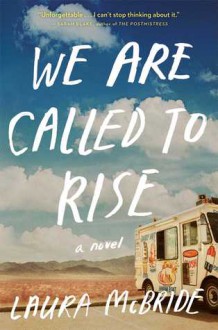
This is a novel about little things and how they all matter. How small acts of courage and kindness can culminate into something wonderful and how seemingly insignificant negative events can manifest into a terrible tragedy.
It’s about regular people facing tough choices and doing the right thing. In that way Laura McBrides’s novel, We Are Called to Rise is positive and uplifting.
When a routine traffic violation turns into a police officer shooting and killing the mother of two young children, Bashkim and Tirana, a disparate group of characters come together and “rise” to mitigate the suffering.
Interestingly, all those who “rise” are women. There’s Avis, the mother of the war veteran Nate, the police officer who shoots the woman. There’s Roberta, the Court Appointed Services Advocate and defender of children; the abueula (grandmother) of Luis a traumatized war vet; Mrs. Monaghan, Baskim’s teacher, Dr. Moore, the elementary school principal, Mrs. Delain, the foster mother; and, even the victim, Bashkim’s mother.
Even low level characters who are women are portrayed as reasonable, including Darcy, the woman Avis’s husband leaves her for, and Lauren the battered young wife of Nate who won’t report his abuse to the authorities because it will jeopardize his job on the police force.
All those who “do not rise”, and in some cases sink are men. They include Bashkim’s paranoid, misogynistic father; Avis’s son Nate, the shooter, wife beater and PSTD sufferer; Luis, a soldier who killed an innocent child in Iraq and has attempted suicide because of his guilt; Avis’s husband Jim who dumps her for no apparent reason after nearly three decades of marriage.
Even minor male characters are portrayed as weak or ineffectual including Roberta’s husband Marty who tells her “she’s bitten off more than she can chew” in trying to help the children; and Corey, Nate’s partner during the actual shooting who is “just sad” and “not likely to be a police officer next year.”
If McBride wanted to balance her gender bias she could have easily made the principal and the school teacher men, or how about giving the foster mother compassionate husband?
They say if you really want to know about an author the best way is to read their fiction. I enjoyed McBride’s fiction and I wouldn’t go as far as to say her gender portrayal is an indication of misandry, but it does give me pause.


 Log in with Facebook
Log in with Facebook 





